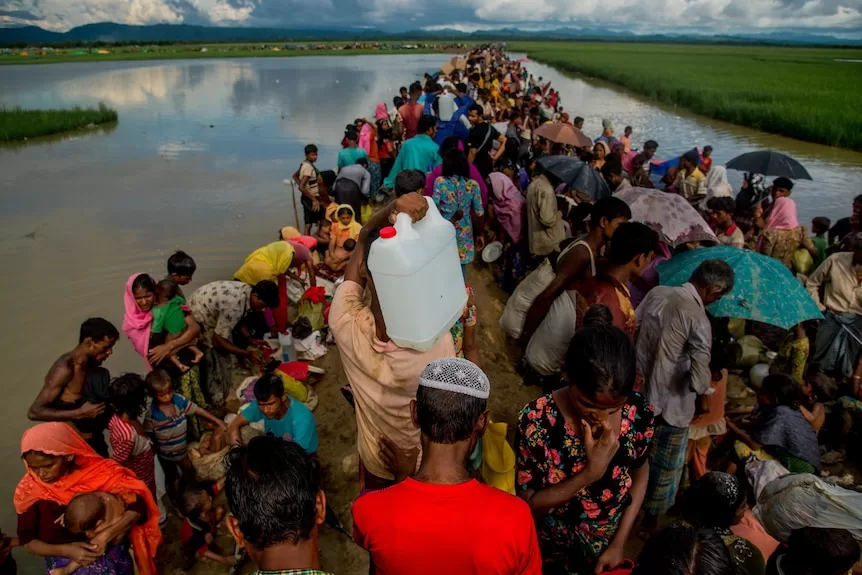Rohingya activists fear civilians could be targeted and thousands forced to leave their homes after a rebel group announced plans to attack Maungdaw, a town home to a large Muslim minority population in Myanmar’s western Rakhine state.
It comes weeks after the Arakan Army was accused of burning down Rohingya homes during an attack on the nearby military government-held town of Buthidaung.
The Arakan Army denies the accusations.
In a statement on Sunday, the group said all residents “are urged to avoid staying in areas such as roads and houses.”
Rohingya activist Wai Wai Nu said she recently spoke to Maungdaw locals who felt trapped.
“The road from Maungdaw to Buthidaung and Sittwe is closed … so they have nowhere to flee,” she told the ABC.
Nay San Lwin, co-founder of the Free Rohingya Coalition advocacy group, also spoke to Rohingya locals in Maungdaw who are living in fear.
“With the Myanmar military base located outside the town and a warning from the Arakan Army just before an important religious festival on Tuesday, they feel specifically targeted,” he told the ABC.
These claims could not be verified independently as communication with Rakhine is extremely difficult, with most mobile networks and access to the internet cut off.
The UN has received “frightening and disturbing reports” in May of new violence against Rohingya civilians by both the military and the Arakan Army.
The fighting in Myanmar that erupted in the wake of the military coup in 2021 has been ramping up in recent months with the junta suffering significant losses to the country’s armed ethnic groups and pro-democracy forces.
The Arakan Army, which seeks autonomy from Myanmar’s central government, began its offensive in Rakhine state about six months ago.
“We see clear and present risks of a serious expansion of violence as the battle for neighbouring Maungdaw town has begun,” a spokesperson for the UN High Commissioner for Human Rights said.
The Rohingya have faced decades of persecution and, after a 2017 crackdown by the military, nearly one million fled to Bangladesh, and “at least 392” villages were partially or wholly burned to the ground.
After 2017 when the majority of Maungdaw’s Rohingya community was expelled or killed, Buthidaung became home to the largest Rohingya community remaining in Myanmar.
Wai Wai Nu fears the impending attack on the Rohingya is part of an effort to systematically “erase” the Rohingya.
Human rights groups warn that ethnic tensions in Rakhine State are worsening.
Spokesperson Liz Throssell of the office of the UN High Commissioner for Human Rights cited the burning of Buthidaung, air strikes, reports of shootings at unarmed fleeing villagers, and beheadings as part of the violence in the northern part of Rakhine in recent weeks.
“Rohingya civilians are trapped in the middle of a conflict between the Myanmar junta, the Arakan Army, and Rohingya armed groups,” said John Quinley, a human rights defender from Fortify Rights.
The UN estimates over 350,000 people are displaced across Rakhine State after years of conflict, many of whom do not have access to basic services.
ABC/wires
